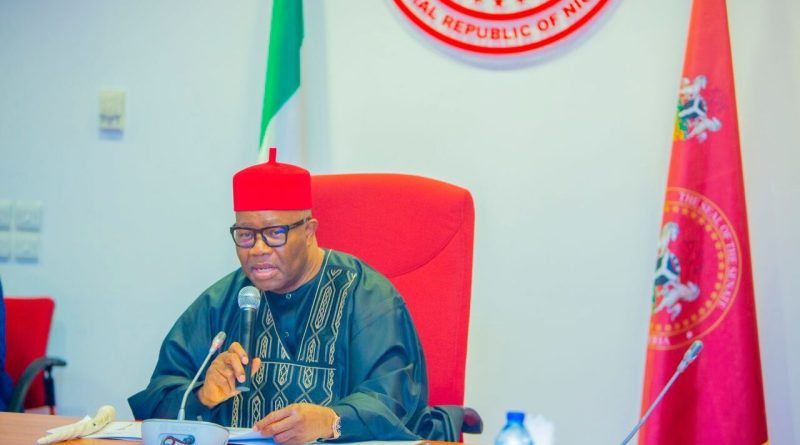Despite rubber stamp allegations, Akpabio insists Senate’s relationship with presidency will remain frank, firm
The Senate President, Godswill Akpabio, on Tuesday maintained that the relationship between the upper chamber and the executive arm of government remains “frank and firm” and would continue to be so regardless of the policies introduced by the President Bola Tinubu administration.
Mr Akpabio also said that the Senate, under his leadership, is not overly eager to endorse every policy proposal presented by the executive.
The senate president made these remarks while addressing lawmakers at the resumption of plenary after eight-weeks annual recess.
“Our relations with the Executive shall remain frank and firm — neither obsequious nor obstructive. Where policies raise our people, we shall lend our strength; where they imperil them, we shall speak on their behalf. We must continue to uphold the independence of this Senate, the dignity of this chamber, and the majesty of the Constitution which governs us all,” he said.
His comments come amid widespread criticism that the current Senate has frequently rushed to approve major executive requests with minimal debate, from massive borrowing plans to controversial policy measures.
On some occasions, lawmakers have even chanted pro-Tinubu solidarity songs during joint plenary sessions.
Since its inauguration in June 2023, the 10th Senate has been accused of prioritising executive convenience over legislative oversight.
So far, the chamber has opposed only one major executive proposal which was the planned deployment of Nigerian troops to Niger Republic following the July 2023 coup in that country.
In that instance, lawmakers urged diplomatic rather than military intervention.
Some controversial approvals by the 10th senate
National Anthem Act: The proposal to reinstate Nigeria’s old national anthem first surfaced in a closed-door session of the Senate in May 2024, where most senators opposed it and called for wider consultation. Yet, within hours, the bill, an executive proposal sponsored by the Senate Leader, Opeyemi Bamidele, passed first and second readings.
Despite the Attorney-General of the Federation, Lateef Fagbemi, advising further consultation during a hurried public hearing, the Senate passed the bill for third reading the next day. The House of Representatives swiftly concurred, and on 29 May 2024, President Tinubu signed it into law.
The new anthem was first rendered at the National Assembly’s joint session marking Mr Tinubu’s first year in office. Many young Nigerians have since criticised the move as a misplaced priority that fails to address pressing issues such as inflation, insecurity, and unemployment.
Rivers State of Emergency: In March 2024, the Senate approved President Tinubu’s declaration of a state of emergency in Rivers State through a voice vote, despite a constitutional requirement that such a decision must be backed by a two-thirds majority in both chambers.
Section 305 (6b) of the Nigerian Constitution mandates that a state of emergency can only stand if supported by at least 73 senators and 240 House members. Critics argued that the use of a voice vote, rather than a recorded roll-call, obscured transparency and accountability in the process.
Overlapping Budgets: The 10th Senate has also presided over an unprecedented era of overlapping national budgets.
In 2024, Nigeria simultaneously operated three budgets: the N21.8 trillion 2023 budget, the N2.17 trillion 2023 supplementary budget, and the N28.7 trillion 2024 appropriation. Although the first two were passed by the 9th National Assembly, President Tinubu extended their capital components first to June and later to December 2024, even while the 2024 budget was active.
The trend continued into 2025, as the capital component of the 2024 budget was extended twice — first to June 2025, then to December 2025. As a result, Nigeria runs two budgets concurrently: the extended 2024 budget and the 2025 appropriation of about N54.2 trillion, which lawmakers increased by N7 billion above the president’s proposal.
READ ALSO: Governors no longer borrow to pay salaries – Akpabio
Both the presidency and parliament have repeatedly defended these extensions as necessary to ensure the completion of ongoing projects.
Loan approvals
In July 2023, President Tinubu sought the Senate’s approval for an $800 million World Bank loan initially requested by former President Muhammadu Buhari to finance the National Safety Net Programme. The Senate promptly granted the approval without hesitation.
In December 2023, the Senate approved the $7.8 billion and €100 million loan package, one of Nigeria’s largest external borrowing plans in recent years, after just 48 hours of committee review.
Barely five months later, in May 2025, the Senate again endorsed another major borrowing request from the Tinubu administration, this time comprising $21.5 billion, ¥15 billion, and a €65 million grant, said to be targeted at infrastructure and security projects.


